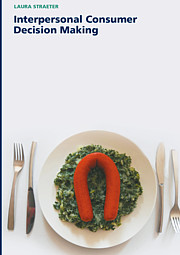Interpersonal Consumer Decision Making Defended on Friday, 8 September 2017
Consumption is not an isolated phenomenon, but quite frequently involves the (in)direct presence of others. For example, people give gifts to, share possessions with, and favor others. In this dissertation I explore how others influence people’s decisions in different interpersonal consumption occasions. The goal is to gain a better understanding of interpersonal consumption decisions that people make to benefit others, to enhance consumer well-being and to provide recommendations for marketers.
The first part of this dissertation addresses gift giving. In particular, it focuses on the motivations of consumers to give a gift and on the strategies that guide gift selection. An apology motive (i.e., the aim to apologize for harm done to the gift recipient) is consistently found to negatively affect the recipient’s gift product evaluation and apology gifts are found to fall short on the giver’s goal to resolve the recipient’s angry feelings. Moreover, recipients like a gift that resembles the giver – even when they dislike the giver.
The second part deals with other non-ritualized gestures, addressing how favors are initiated and received. Although the opposite has been suggested, consumers feel more inclined to return a favor received from a friend than a favor received from a commercial partner. Consumers are generous towards friends and give away their possessions. Nonetheless, friends find it difficult to accept such kind gestures and would rather borrow instead of receive a possession from a friend.
Overall, the interpersonal consumption research presented in this dissertation provides insights for both consumers and marketers and challenges them to improve their practices in the domain of gifts and non-ritualized favors. Marketers should reconsider the positioning of products as apology gifts. They could also optimize their search engine algorithms to recommend gifts that relate to previous purchases of their customers. In addition, marketers should be aware that a favor given to a customer might not lead to the aimed reciprocal benefits for the company.
Keywords
Interpersonal Consumption, Relationships, Gift Giving, Sharing, Sharing Economy, Anger, Social Equity, Self-Other Empathy Gap












